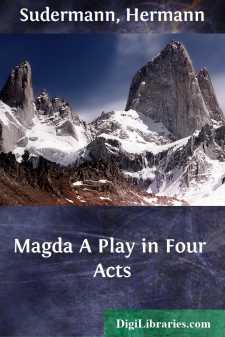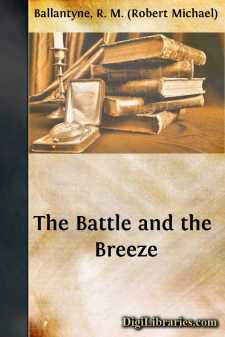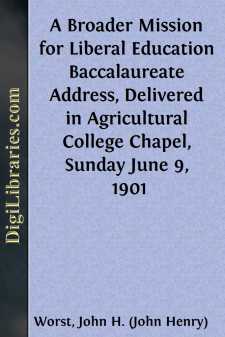Categories
- Antiques & Collectibles 13
- Architecture 36
- Art 48
- Bibles 22
- Biography & Autobiography 813
- Body, Mind & Spirit 142
- Business & Economics 28
- Children's Books 13
- Children's Fiction 10
- Computers 4
- Cooking 94
- Crafts & Hobbies 4
- Drama 346
- Education 46
- Family & Relationships 57
- Fiction 11828
- Games 19
- Gardening 17
- Health & Fitness 34
- History 1377
- House & Home 1
- Humor 147
- Juvenile Fiction 1873
- Juvenile Nonfiction 202
- Language Arts & Disciplines 88
- Law 16
- Literary Collections 686
- Literary Criticism 179
- Mathematics 13
- Medical 41
- Music 40
- Nature 179
- Non-Classifiable 1768
- Performing Arts 7
- Periodicals 1453
- Philosophy 64
- Photography 2
- Poetry 896
- Political Science 203
- Psychology 42
- Reference 154
- Religion 513
- Science 126
- Self-Help 84
- Social Science 81
- Sports & Recreation 34
- Study Aids 3
- Technology & Engineering 59
- Transportation 23
- Travel 463
- True Crime 29
Sort by:
CHAPTER I. Departure from Vienna—Scene on board the steamer—Hainburg—Presburg—The “Coronation-mount”—Pesth—Ofen—The steamer Galata—Mohäcs—The fortress Peterwardein—Discomfort and bad management on board the steamer—Semlin—Belgrade—Pancsova—Austrian soldiers—The rock Babakay—Drenkova—Falls of the Danube—Alt-Orsova—The “Iron...
more...
GOOD IN ALL. THERE IS GOOD IN ALL. Yes! we all believe it: not a man in the depth of his vanity but will yield assent. But do you not all, in practice, daily, hourly deny it? A beggar passes you in the street: dirty, ragged, importunate. "Ah! he has a bad look," and your pocket is safe. He starves—and he steals. "I thought he was bad." You educate him in the State Prison. He does not...
more...
MAGDA. ACT I. Scene. Living-room in house of Lieutenant-Colonel Schwartze, furnished in simple and old-fashioned style. Left, at back, a glass door with white curtains through which the dining-room is seen. There is also a hall door, through which a staircase to the upper story is visible. Right, a corner window, with white curtains, surrounded by ivy. Left, a door to the Lieutenant-Colonel's...
more...
by:
Charles King
The snow had gone from all the foot-hills and had long since disappeared in the broad river bottom. It was fast going from the neighboring mountains, too—both the streams told plainly of that, for while the Platte rolled along in great, swift surges under the Engineer Bridge, its smaller tributary—the "Larmie," as the soldiers called it—came brawling and foaming down its stony bed and...
more...
Touches on our Hero’s Early Life, Experiences, and Adventures. Bill Bowls was the most amiable, gentle, kindly, and modest fellow that ever trod the deck of a man-of-war. He was also one of the most lion-hearted men in the Navy. When Bill was a baby—a round-faced, large-eyed, fat-legged baby, as unlike to the bronzed, whiskered, strapping seaman who went by the name of “Fighting Bill” as a...
more...
by:
Steven E. Jones
I. Introduction A few years ago, I woke up to the fact that half of the world's peoples must burn wood or dried dung in order to cook their food. It came as quite a shock to me, especially as I learned of the illnesses caused by breathing smoke day in and day out, and the environmental impacts of deforestation -not to mention the time spent by people (mostly women) gathering sticks and dung to...
more...
by:
Marsden Hartley
Perhaps the most important part of Criticism is the fact that it presents to the creator a problem which is never solved. Criticism is to him a perpetual Presence: or perhaps a ghost which he will not succeed in laying. If he could satisfy his mind that Criticism was a certain thing: a good thing or a bad, a proper presence or an irrelevant, he could psychologically dispose of it. But he can not. For...
more...
Industrial Education for the Negro By BOOKER T. WASHINGTON, The necessity for the race's learning the difference between being worked and working. He would not confine the Negro to industrial life, but believes that the very best service which any one can render to what is called the "higher education" is to teach the present generation to work and save. This will create the wealth from...
more...
by:
Edward Bellamy
It is a village street, with great elms on either side, while along the middle stands another row set in a narrow strip of grassy common, so that the street and roadway are in reality double. The dwellings on either side are not only widely parted by the broad street, but are still further isolated, each in its large garden of ancient fruit trees. It is four o'clock of a sunny August afternoon,...
more...
In America we recognize no aristocracy except that of genius or of character. Our countrymen are all citizens. Our government was founded upon the principle that "all men are created free and equal" and though intellectual endowments differ widely in individuals, yet special privileges are accorded to no one as a birthright. Therefore the college graduate, as well as any other aspirant, must...
more...











